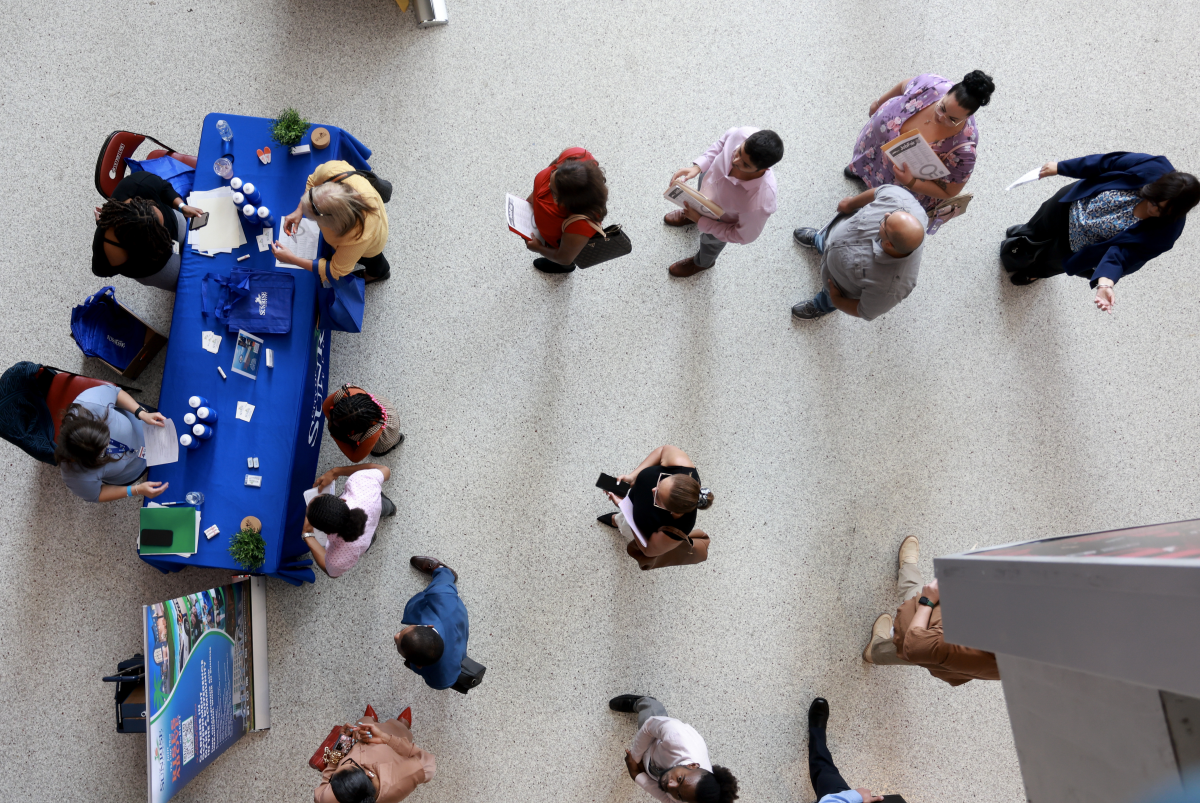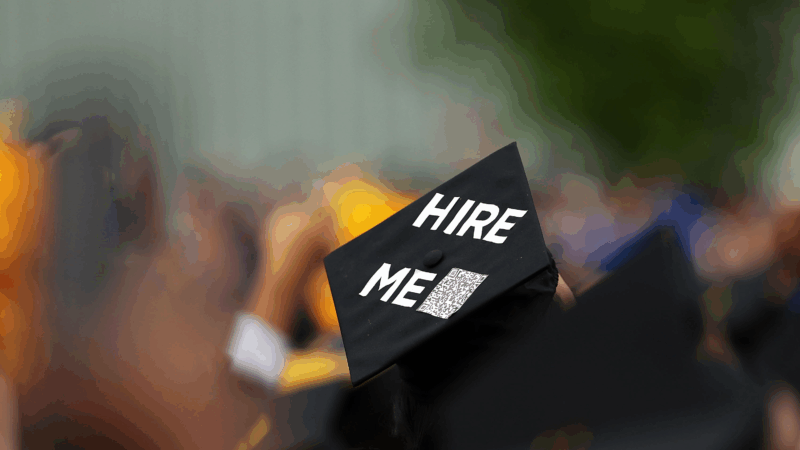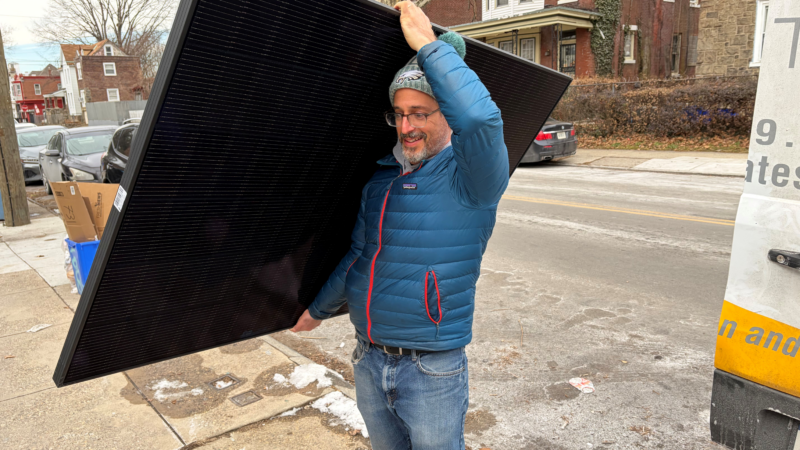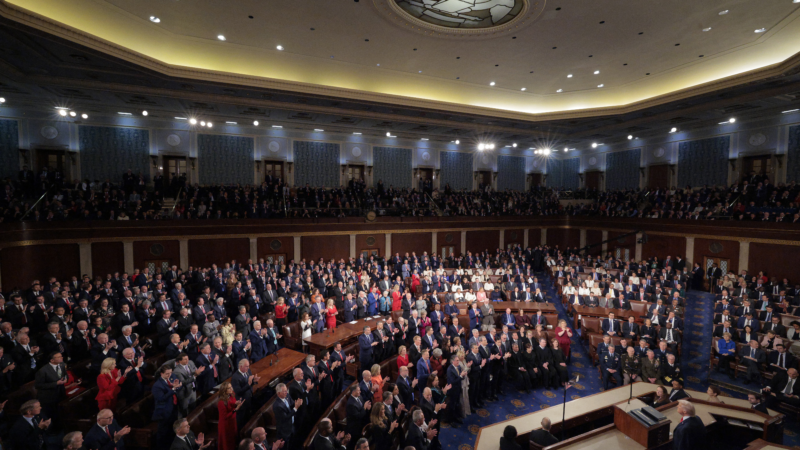‘Panicking’: Why recent college grads are struggling to find jobs
Azraiel Raines dreamed of working for the State Department, when she graduated from Idaho State University with a degree in global studies.
But the State Department is not hiring. In fact it cut more than 1,300 jobs this past week as part of a broader government downsizing.

“My very first avenue was poof, gone,” Raines says.
As graduation approached, she interviewed at law firms, but never got a call back. Applications for school district jobs also came up empty.
“I was panicking,” Raines says. “What am I going to do if I don’t have a job after graduation?”
Eventually, she landed a position in the counseling department at her alma mater in Pocatello, Idaho, where she oversees community outreach.
“Which is not something I envisioned myself doing,” Raines says. “But it’s using my skills in ways I didn’t think I’d be able to, and the people there have been really great, so it’s helped a lot.”
Economists say Raines is not alone among recent college graduates in struggling to find work. Although the overall unemployment rate is just 4.1%, few people are quitting jobs today, and employers are skittish about hiring.
That means there are fewer opportunities for newly-minted graduates to get a foot in the door.
“The labor market for recent college grads in 2025, so far, is among the most challenging in the last decade, apart from the pandemic period” says Jaison Abel, an economist at the Federal Reserve Bank of New York.
It’s not just the federal government cutting jobs
In addition to job cuts by federal government, tech companies and consulting firms are also scaling back after a period of rapid growth. And employers overall have been cautious about hiring in the face of uncertain trade and tax policies.
“What happens, basically, in a time when there’s uncertainty is that businesses tend to hold steady, wait and see,” Abel says. “So hiring really kind of slowed.”
Some employers may also be using artificial intelligence to perform tasks that entry-level workers used to do, although Abel suspects that’s still fairly uncommon.
“It’s unlikely that that’s really the main driver of these trends, in large part because the adoption of AI so far has been fairly limited,” he says.
Settling for lower pay
Many recent graduates who do find work — including Raines — have had to settle for lower salaries than they hoped for. A survey by the job-search firm ZipRecruiter found a larger-than-usual gap between the salaries college seniors hoped to receive and the paychecks they actually found once they finished school.
“I think it says that the competition is fierce. The market is tight. And employers are hiring more cautiously,” says ZipRecruiter career expert Sam DeMase. “I think it’s an employers’ market at the moment.”
That’s a turnaround from last fall, when many firms were planning to ramp up their recruiting among college graduates, according to the National Association of Colleges and Employers. By the time NACE did a follow-up survey this spring, hiring plans had been scaled back to roughly what they were in 2024.
Nicole Hall, who’s chair-elect of NACE and Dean of Students at the University of Virginia, says that means graduates have to be more flexible in their job searches.
“Because the market is uniquely challenging, we’ve seen students be very open to thinking about how they can apply their skills,” Hall says.

She stresses that even if a graduate’s first job out of school is not what they were hoping for, it can be an important stepping stone.
“As long as they embark on that experience and it’s something they leave later with greater skills and knowledge, that’s something that’s going to serve them well,” Hall says.
Research by Abel and his New York Fed colleague Richard Deitz has found that while many graduates have to settle for less challenging work right out of school, most find more rewarding positions within a few years.
“It’s probably not best to judge the value of a college degree right after your graduate,” Deitz says, “but to think of it as an investment you’re making that bears benefits over your entire working life.”
While the unemployment rate among recent graduates is higher now than it was in previous years — close to 6% this spring — it’s lower than the jobless rate among young people who don’t have a college degree. That’s nearly 7%.
Raines is happy for now with her job at Idaho State University. While she’s working, she’s hoping to take advantage of the school’s employee discount on studies towards a master’s degree in public administration, just in case a job does open up at the State Department some day.
“I don’t want to give up on it just yet,” she says. “But we’re taking a little detour right now.”
When a horse whinnies, there’s more than meets the ear
A new study finds that horse whinnies are made of both a high and a low frequency, generated by different parts of the vocal tract. The two-tone sound may help horses convey more complex information.
Hundreds of American nurses choose Canada over the U.S. under Trump
More than 1,000 American nurses have successfully applied for licensure in British Columbia since April, a massive increase over prior years.
Trump’s many tariff tools mean consumer prices won’t go down, analysts say
The Supreme Court struck down President Trump's signature tariffs. But the president has other tariff tools, and consumers shouldn't expect cheaper prices anytime soon, economists say.
Tax credits for solar panels are available, but the catch is you can’t own them
Rooftop solar installers are steering customers toward leases instead of purchases. Federal tax credits for purchased systems have ended but are still available for leased ones.
5 takeaways from Trump’s State of the Union address
President Trump hit familiar notes on immigration and culture in his speech Tuesday night, but he largely underplayed the economic problems that voters say they are most concerned about.
China restricts exports to 40 Japanese entities with ties to military
China on Tuesday restricted exports to 40 Japanese entities it says are contributing to Japan's "remilitarization," in the latest escalation of tensions with Tokyo.







